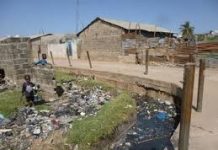By KebbaJeffang and Suwaibou Touray A large number of Muslims in diverse places in the Greater Banjul Area were prevented by the security forces from praying on Tuesday, 29 July 2014, to mark the end of the Ramadan month of fasting. This development came on the heels of the announcement made by President Yahya Jammeh at state house on Monday, 28 July, during his meeting with the Banjul Muslim elders after the Eid el Fitr prayers and in which he asked the security to prevent anyone from praying the following day. This Foroyaa reporter was out and about to find out whether there were some Muslims who wanted to pray on Tuesday and whether they proceeded with it and had visited Bakau, Brufut and Basori in the Western Region. Visiting the mosque of the Mouride brotherhood in Bakau New Town yesterday, this reporter found a huge presence of the security forces consisting of the police and Immigration personnel who even outnumbered the former. The security however did not allow them to proceed with the Eid prayers. Muhammed Sarr, one of those who came to pray, expressed his displeasure with the decision to prevent them from observing the Eid on that day and described the move as unprecedented as far as he is concerned. “I am forty five years now but have never witnessed such a thing in my life: the state preventing Muslims to pray?” he exclaimed. He said the country has been very tolerant to religious beliefs but added that what is happening now is alarming. Mr. Sarr said people should be free to choose not to follow Mecca regarding the sighting of the moon. “The Supreme Islamic Council is free to follow Mecca and other Muslims are also at liberty to do what they think is right. There shouldn’t be any compulsion,” he said. Alieu Njie, a resident of Brufut, said he could not pray due to the order given that they should not be allowed to pray.” Some people in Brufut did pray on Monday, but for some of us since we did not see the moon we have decided to fast and pray the next day and there is no harm in this. What we have learnt is that we should pray or fast based on the sighting of the moon but not to follow Mecca,” said Njie. He said they are being prevented from praying in the name of maintaining unity but that this is what is dividing Muslims,” he argued. He called on the authorities to refrain from interfering in the peaceful religious beliefs of people. When this reporter visited Basori in Kombo East, he was told by the village Alkalo, Lamin Mabintang Jabang, that they intended to pray yesterday (Tuesday) but decided not to do so because of the president’s announcement. He said police officers came to his village in the morning but that no one was arrested because they did not pray. Some of the villagers expressed disappointment and displeasure for being unable to mark the feast with prayers after fasting for 29 days. They said religion should be free from political interference as there is no compulsion in it. They called on the Supreme Islamic Council to dialogue with the Muslims. This reporter was informed by sources that Muslims in places such as Bwiam, Darsilami, Jiramba, Kankuntu and Sangajor Darsilami in the Western Region did not observe the Eid because of the announcement preventing them to pray. The president in his statement at the meeting broadcast by the state owned GRTS said Muslims in the country should pray together on a date declared by the authorities whom he said would keep the peace. He alluded to happenings elsewhere and asserted that that must be avoided at all cost. He vowed by swearing to the Qur’an that any village or community in the Greater Banjul Area that celebrates the Eid on Tuesday would suffer the consequences. He said he has given an order to the Interior Minister to arrest anyone who converges at praying grounds. Interestingly enough, by 10pm July 28th, the GRTS announcement informed that the provincial regions, ie. LRR, NBR, CRR and URR were excluded from the ban and are therefore allowed to pray on Tuesday, July 29, 2014; that the WCR, KM and Banjul are not allowed to perform the Eid prayers and that anyone who does so would be dealt with according to law. This was confirmed by the members of the Supreme Islamic Council led by Imam Fatty who called on the faithful to cooperate with the security forces and refrain from praying today, July 29. ]]>
© 2019 Foroyaa Newspaper - Site by DigiTech Solutions





















